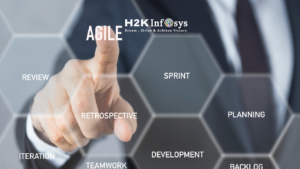Teams now place a greater emphasis on productivity, efficiency, and customer satisfaction in today’s Lean-Agile Methodology fast-paced and fiercely competitive corporate environment. As the traditional method of working long hours with excessive planning is no longer viable in 2023, the term “work smarter, not harder” has become a catchphrase.
Businesses cannot afford to waste time and resources on sophisticated plans that may or may not become obsolete once implemented since consumers now demand nothing less than immediate replies and gratification. As a result, businesses are turning more and more to the Lean-Agile methodology. You can learn more about Lean-Agile methodology by checking out the Agile Scrum course online.
Enterprise agility and the Lean concepts of minimising waste and maximising value allow firms to:
- Create a workflow that is simple, effective, and flexible.
- Cut expenses.
- Swiftly adapt to changing consumer demands and industry trends.
- Deliver ongoing and small-scale product and service upgrades.
- Boost communication and client interaction.
- Encourage a spirit of cooperation and problem-solving.
- Deliver the best calibre goods and services to consumers in the least amount of time.
In-depth explanations of the Lean-Agile methodology are provided in this article, along with examples of how it might be used in various industries.
What is the Lean-Agile Methodology?
The Lean-Agile methodology prioritises speed, adaptability, collaboration, project management, and product creation by fusing two essential business concepts. It combines Lean manufacturing principles (minimising waste and maximising value) with Agile software principles; quickly delivering value, adapting to change, and inviting client feedback.
The principles of lean and agile work together to enhance processes and results. They make it possible for businesses to work more efficiently and produce greater results. They encourage cross-functional cooperation and teamwork to make the most of staff members’ abilities and knowledge. The concepts promote experimentation, waste reduction, streamlining of procedures, increased customer happiness, and enhanced product quality.
What Industries Can Leverage the Lean-Agile Methodology?
Although the Lean-Agile methodology is not exclusive to any single business or area, it has been particularly successful in the following four fields.
1.Software Development.
The Agile Manifesto was developed in 2001 as a framework by 17 frustrated software developers to advance their sector. Their manifesto still serves as a guide for the Lean-Agile methodology’s essential Agile practices today.
As an example of a corporation using the Lean-Agile technique, look no further than Spotify. To quickly create and roll out new products to users, the company works with small, cross-functional teams that operate independently. Using user feedback, these teams manage tasks according to their areas of expertise and respond quickly to altering requirements while continuously enhancing the product.
2.Manufacturing.
Lean principles were first applied in the manufacturing sector to reduce waste, enhance productivity, boost value, and make project management and product development more cost-effective.
Toyota invented lean manufacturing techniques, and as a result of its emphasis on waste elimination, greater productivity, and continual development, Toyota is now the most valuable automaker in the world.
3.Healthcare.
The healthcare sector can benefit from the Lean-Agile methodology by improving patient outcomes, cutting costs, and making better use of feedback and communication.
A notable example of a healthcare organisation that successfully used the Lean-Agile methodology is Boston’s Brigham and Women’s Hospital. The hospital overhauled annual wellness visits after implementing a Lean-Agile framework, with cross-functional teams cooperating based on skills and insights. In addition, the hospital improved the process of providing care by receiving input from doctors and patients. When necessary, they could quickly alter their direction.
4.Finance.
By incorporating continuous improvement, collaboration, agile budgeting, value stream mapping, and data-driven decision-making, the Lean-Agile methodology can aid finance teams in streamlining operations and improving efficiency.
Germany’s first agile bank, ING, a 300-year-old global bank, adopted Lean-Agile in 2015. The “PACE” transformation model, created by ING, intends to:
- Streamline the software development and project management processes.
- Support earlier product and service launches.
- Connect the needs of the ING-adapted process to design thinking, lean startup, and agile approaches.
PACE additionally makes ING validate its innovations with clients to guarantee that funds are spent to enhance their quality of life.
Conclusion
Adopting a Lean-Agile methodology requires time and effort. A fundamental cultural shift is necessary. To thrive, business leaders must place a high priority on teamwork, openness, and continual development. Organisations must have a thorough grasp of their workflows, procedures, and objectives to do this.
But even though it takes time, the outcome is frequently worthwhile. Regardless of their industry, businesses may promote innovation and agility and effectively improve product outcomes by putting these values first and building on the methodology’s guiding principles. Check out a good Agile Scrum certification online course today to learn more about Agile Scrum methodology.



























